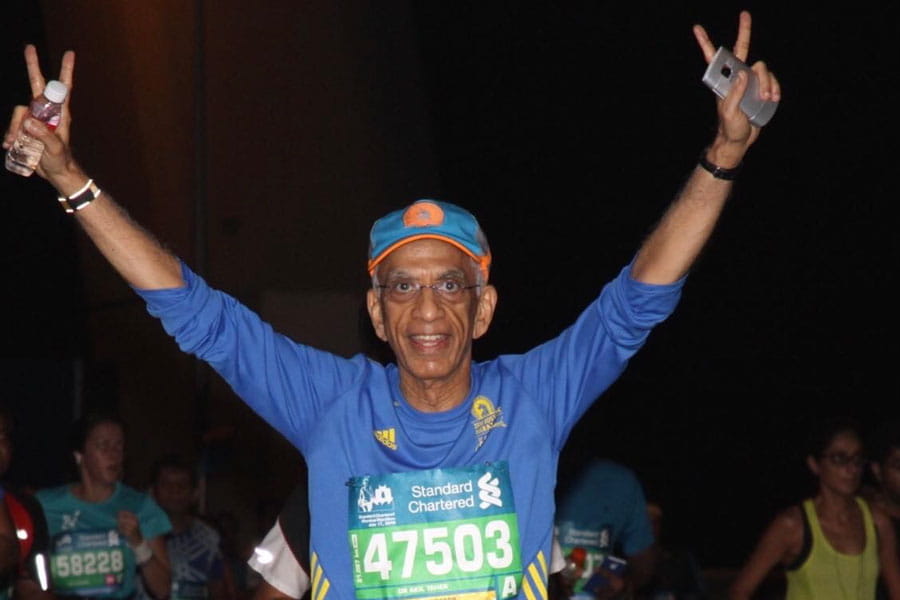How one doctor turned his life around in the wake of heart disease

When Dr. Akil Taherbhai talks about the importance of managing cholesterol, he speaks from experience.
The family practice doctor, who goes by Dr. Taher, has a family history of heart disease. One of his independent risk factors for heart disease is high LDL, known as bad cholesterol. But he didn’t think heart disease could happen to him — and he didn’t pay much attention to diet and exercise until he had no choice.
He was a self-described couch potato with a belly, a food aficionado who shunned exercise. His genetics and lifestyle caught up with him when he was diagnosed with coronary artery disease at age 56 and required lifesaving bypass surgery at age 61.
Then he got serious. After decades of making unhealthy lifestyle choices, he refused to give up on life.
“I decided that I must heal my body without solely relying on medications and invasive surgery,” he said.
Dr. Taher embraced a plant-based diet and started exercising — first walking, then jogging, then running. Since his heart health wake-up call, he got off the sofa and has completed marathons and triathlons. He tackles daredevil physical adventures that he once never imagined — cycling, bungee jumping, skydiving, snorkeling and hang gliding. He’s climbed literal mountains, including Mount Kilimanjaro in Tanzania, the highest freestanding mountain above sea level in the world.
He’s now an advocate for heart-healthy habits, sharing his story in his book Open Heart, on podcasts and YouTube videos. Dr. Taher’s sky-high LDL level — plus elevated lipoprotein(a), another genetic risk factor — contributed to his poor heart health. Too much LDL cholesterol in the blood can join with fats and other substances to build up in the arteries. The arteries can become clogged and narrow, and blood flow is reduced, increasing the risk of heart attack and stroke.
It’s important to understand that high LDL cholesterol is a silent threat. There aren’t symptoms of high LDL, and the only way to know your cholesterol numbers is to have a simple blood test. After the test, your health care professional will share the numbers with you, help you understand your LDL level and create a plan to lower the number if needed.
Dr. Taher made significant changes to his lifestyle after his heart surgery. In addition to adopting healthy habits, he took statins, a type of prescription medication used to lower LDL. When that wasn’t enough, he began taking evolocumab injections, a prescription medication designed to further lower LDL levels.
Dr. Taher credits six lifestyle changes that improved his overall health and helped him survive heart disease.
Nutrition: Dr. Taher was once a “see food” eater, indulging in all the rich foods he saw. He now follows a plant-based diet, focused on fruits and vegetables, nuts, whole grains, beans and legumes, with limited ultra-processed food.
Physical activity: When he started his own fitness journey, he started walking, then advanced to jogging and running. Eight months later, he ran a half-marathon and then tackled full marathons and triathlons.
Sleep: “Sleep is not just the absence of being awake,” he said. He prioritizes restorative sleep to support healing, memory, immunity and mental health.
Stress: He found healthy ways to manage stress, including gardening, cooking, yoga and meditation.
Alcohol: He no longer drinks alcohol with small exceptions for special occasions.
Support: It’s crucial for our health that we have robust support groups, he said. “Being lonely is not OK.” In his home country of India, multiple generations of family members live together, providing a built-in support network. That’s not as common in the United States, so he says we have to be deliberate about seeking and building support and accountability.
Similarly, the American Heart Association recommends Life’s Essential 8, health behaviors to help lower the risk for heart disease, stroke and other major health problems.
Dr. Taher recognizes that it can be overwhelming to tackle a health problem such as high LDL all at once. He started by taking small steps toward healthier habits, and he focused on living a life of purpose. With time and support, he’s discovered that change is possible – the kind of change that Dr. Taher is grateful for every day.
“I am mentally, physically and emotionally better now than I was before,” he said.
Take control of your health today. Learn how to lower your risk.





